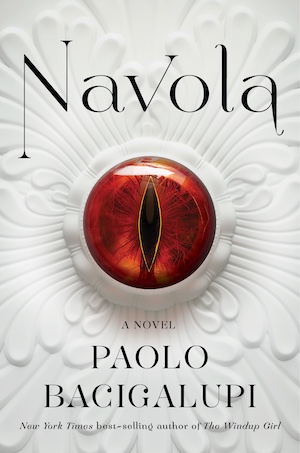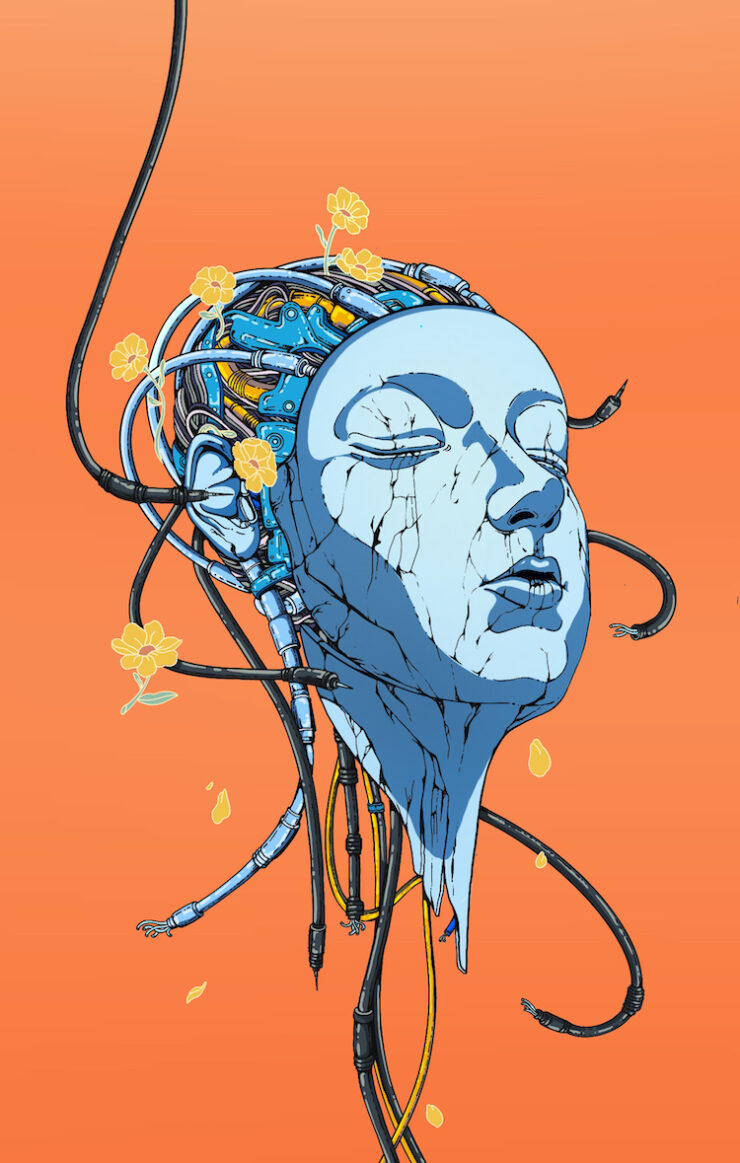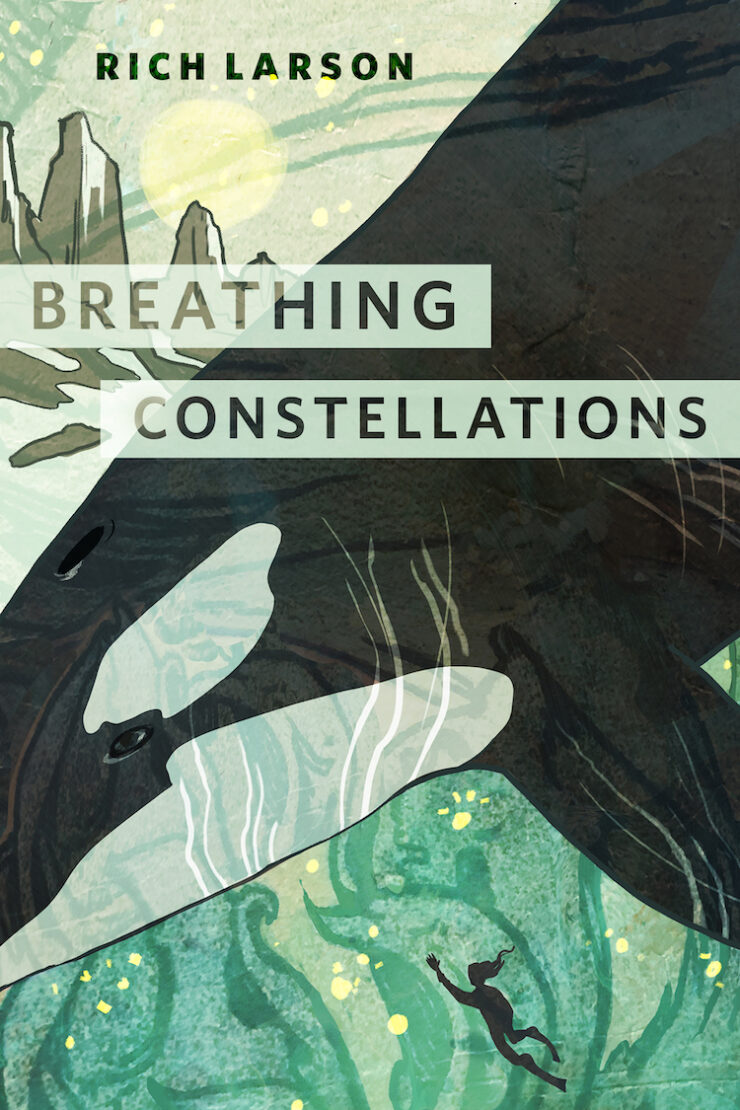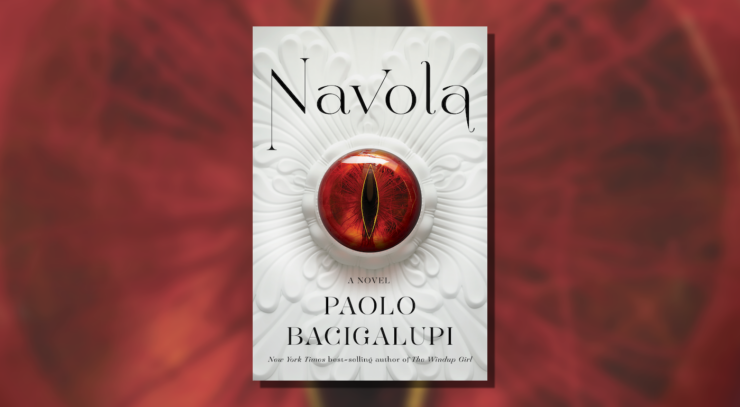We’re thrilled to share an excerpt from Navola, a brand new fantasy novel by Paolo Bacigalupi publishing with Knopf on July 9th.
In Navola, a bustling city-state dominated by a handful of influential families, business is power, and power is everything. For generations, the di Regulai family—merchant bankers with a vast empire—has nurtured tendrils that stretch to the farthest reaches of the known world. And though they claim not to be political, their staggering wealth has bought cities and toppled kingdoms. Soon, Davico di Regulai will be expected to take the reins of power from his father and demonstrate his mastery of the games of Navolese diplomacy: knowing who to trust and who to doubt, and how to read what lies hidden behind a smile. But in Navola, strange and ancient undercurrents lurk behind the gilt and grandeur—like the fossilized dragon eye in the family’s possession, a potent symbol of their raw power and a talisman that seems to be summoning Davico to act.
As tensions rise and the events unfold, Davico will be tested to his limits. His fate depends on the eldritch dragon relic and on what lies buried in the heart of his adopted sister, Celia di Balcosi, whose own family was destroyed by Nalova’s twisted politics.
Chapter 1
My father kept a dragon eye upon his desk. An orb larger than a man’s skull, gone milky and crystalline but still burning with inner fire as if it retained life. He kept it on his desk next to the quills where he signed parchment debts and took trading signatories on linen and raw iron and neru resin and cardamom and silk and horses. He kept it on the desk where he made loans for shipbuilding and war. The dragon eye sat beside a Sag dagger and the Callarino’s golden sigil of high office.
Trading codexes lined my father’s library, the records of all the promises that he kept in far-off lands. He liked to say that he traded in goods, but more in promises, and he never failed to collect. This was how he came to own the dagger of the Sag man and the Callarino’s sigil—the collecting of promises.
But the dragon eye he had purchased from far-off Zurom.
Of the dragon eye’s authenticity there could be no doubt. It was not round, as one might think; it retained tendrils of draconic nerves crystallized—fine shards, sharp as daggers—that trailed from hind the eye so that it was less an orb than a teardrop.
The sharp trailing nerves made it appear as if it were the burning comet immortalized in Arragnalo’s sketches upon the ceiling of the Callendra’s rotunda, seen in skies from Losiccia to Pagnanopol, and now fallen to our human earth. The eye seemed to glow with the very fury of the heavens—a vitality that could not be extinguished, even by death.
When I was a small child, I would play in my father’s library with my hound, and sometimes I would see it out of the corner of my eye: a fossil that was not bone, a jewel that was not stone.
I called my hound Lazy, for she only roused herself to play with me, and never for any other. When I was close, her tail would wag and she would seek me out, and then we would run through the galleries of my family’s palazzo, up and down the wide halls, through the courtyards and porticoes and gardens, up and down the wide staircases of the living quarters, and round and round the tight spiral defenses of our tower. Our shouts and barks echoed across cobbles and parquet, bounced amongst the faces of my ancestors depicted in their portraits, and filled the frescoed rooms with their high painted ceilings where the Bull of the Regulai always paced.
We two had the run of the palazzo—and took it for granted as only the young and the innocent can—but when we were in my father’s library, for reasons neither of us understood but somehow felt necessary, we were as silent as thieves stealing in the Quartiere Sangro.
The dragon demanded reverence, even from ignorant children and lanky-legged puppies.
Buy the Book


Navola
While the authenticity of the eye was impossible to assail, its pedigree was less so. The trader my father bought it from claimed it came from a wyrm that had terrorized the sands and red cliffs of Zurom for more than a century before finally being slain by a great warrior with a blade cast of diamond.
The eye thence was offered to a rapacious sultan to forestall a terrible war and to rescue a princess. There was more to the story: the luminous beauty of the maiden imprisoned by the sultan, the lasciviousness and debauch of that cruel ruler, the nefarious sorceries the sultan cast to trick the warrior, the triumphant breaking of the maiden’s chains, and the final tragic betrayal of the warrior. The fall of empires. The drifting of time and sand. The collapse of ancient cities into legend…
What could be verified was that the eye had been excavated from the crypt of a powerful ruler—with a touch of slip-speak as to whether this constituted scholarly discovery or outright looting—but in any case a turn of events that led to the eye falling into the merchant’s caravan and traveling the trade routes over the icy Khim and Kharat passes, and thence traversing the whitecapped waves of Oceana Cerulea to our own fine city of Navola, the beating heart of banca mercanta for all the lands that spoke Amo’s dialects, and finally to my father, Devonaci di Regulai, famous for his wealth and influence throughout the lands that touched La Cerulea’s azure waters.
Whatever the merchant’s claims about the eye’s origins, my father maintained that the dragon’s death had not come from a hero’s sword but most likely old age. If a sword had ever pierced the great beast’s scales, it had occurred in postmortem butchery, not heroic battle. Dragons did not submit to the likes of human blades—not even diamond ones.
But he bought the eye anyway, paying without bargaining (and assuring the merchant’s name for a hundred years with the price), and he set the artifact upon his desk. When men came to sign contracts and make promises, he would make them swear upon the eye of a dragon. In this way, business partners were adequately warned that they dealt not with some mere notary-silver in Quadrazzo Maggi but with Devonaci di Regulai da Navola and nothing would protect them when he sought a return on his promises.
My father had a dragon eye.
That long-dead sultan of Zurom did not have one.
The king of far-off Cheroux did not have one.
Our own Callarino of Navola did not have one.
In fact, no one could say they had one. Perhaps a scale of a dragon. Or sometimes, maybe, a fossil thing a man might claim was a tooth. But this terrifying crystallized memory of power, this was something different indeed. The cat’s-eye iris still held its orange color, even though the surface had gone milky. It glowed with an inner light that even death had not extinguished.
Whenever I was in my father’s library, the dragon eye always seemed to watch me. It seemed to track me each time I entered there, hungry. It frightened me, but, if I’m honest before Amo, it drew me as well.
When my father wasn’t present, away on one of his journeys to meet with the promissories of our far-flung empire of trade, I would sometimes sneak into his library and stare at it: the milky sheen of the surface, the trapped flaming rage within its winking cat-slit eye. An eye as large as my whole head. Staring with fury at our quotidian human endeavors. Our buying and selling of bales of champa wool and sacks of wheat.
It frightened me.
And it drew me.
And one day, I touched it.
Chapter 2
But perhaps I should explain to you my father and my father’s sphere. Who were we, indeed, who carried archinomo Regulai? Who were we that my father could purchase such an artifact?
The Regulai name was old, stretching back to the time before Amo, and over time it had become proud. My ancestors witnessed the great wave that swept away thousands when Oceana Cerulea lashed us with her wrath in the time of old empire. We survived Scuro’s plagues when they ravaged our land, leaving black-pustuled corpses piled as high as rooftops. Like so many Navolese, we fled to the mountains when the great capital of Torre Amo fell to the Khur, and the empire of the Amonese shattered to pieces, and petty dukes, priests, and brigands all declared themselves lords, and wars were fought for glory and territory all up and down the Cerulean Peninsula.
And like so many, when the wars were ended, we returned to our beloved Navola by the sea.
In our earliest days, the Regulai were simple wool merchants, trading with the villagers and herdsmen of the mountainous Romiglia and then hauling that wool out of the wilds to sell to Navola’s loom guild. Later generations learned the arts of abacus and letters. Gradually our people became less of the country and more of the city. We settled in Via Lana, surrounded by the clack of looms and the reek of linen dye and the eternal chatter of mercantae bargaining with the loom guild. We sent proxies into the wilds to gather the wool while we instead learned to write and stamp contracts, using our name as guarantee. We made small loans to other merchants, insured traders against bandits and beasts, and slowly the power of our promises came to be known.
But it was my great-grandfather who made us one of the archinomo of the city.
“Deiamo di Regulai,” my father’s numerari Merio said, “would be much offended at your complaints of boredom at doing the work of a scriveri.”
I was quite young at the time, no more than eight or nine years under Amo’s light, and I chafed at my writing lesson. I desperately wished to be outside in the sunshine with Lazy, my newly given puppy with her silly fat paws and her whiplike wagging tail. Instead I was trapped inside the dimness of our bank’s scrittorium, sitting beside Merio, surrounded by scriveri, numerari, and abacassi, all of them scratching away with their quills and clicking away with their abacuses. Merio clucked his tongue at my handwriting. “Your great-grandfather knew every part of his business, and scorned none of it.”
I stifled a yawn.
Merio flicked my ear.
“Pay attention, Davico. The sooner you are finished, the sooner you run and play.”
I bent once more to my labor. Around me, adults worked steadily, adding numbers in their columns, marking down deposits and withdrawals for acconti seguratti, reading and responding to the letters that came and went throughout the day. The walls of the scrittorium were filled with the evidence of their work: account books, correspondence, contracts, guidance for numerari on the rules of exchange and the Laws of Leggus. All of this was bound in books, written on vellum scrolls, stacked in paper piles—scribbled on linen rags in a few odd cases—and arranged by region, commodity, and merchant. All of it was locked in iron-latticed cabinets to protect our secrets from would-be spies.
In this shadowed and stinking vellum world I toiled, kneeling upon a chair to gain the height I needed to work at Merio’s desk, all the while acutely aware of the day passing, sunlight stealing across the floor as Amo drove his chariot across the sky.
Beyond the window, a cascade of shouts and calls, bleats and barks announced that the streets were full of life. Carts clattered, livestock groaned, roosters crowed, peacocks cried, and the conversation and laughter of merchants, peasants, archinomi, and vianomae filtered up to me, all of them beckoning, all of it accompanied by intriguing smells—ripe fruit, new manure, bright perfumed flowers—and none of it was I permitted to go and see.
My task that day was to copy a contract whose meaning I barely grasped. The words were large, the numbers larger, and the terms of art abstract and cursed with hidden meanings. Words like promissorio and fallimante. Phrases like usanza da Banca Regulai, controllar da Navola, cambio del giorno, and definis da Vaz. Mostly, I remember the script as a tricksy serpent thing that led nowhere pleasant, and went on and on.
“Your great-grandfather understood that to practice every aspect of his business was not a duty but an honor.” Merio peered down through the slit windows to the street below, each window designed very tall to let in light, but also very thin so a thief could not squeeze through. “From the most drudgerous to the most elevated, it was all his honor.” He sucked his teeth thoughtfully. “Tuotto lavoro degli scriveri,” he said. “Tuotto lavoro degli numerari.”
He came to look over my shoulder and examine my progress. “Deiamo wrote this very promissorio that you now copy and turn to new purpose. Your hand follows his. Imagine that, Davico. A contract written by a man who has long ago ascended to Amo, and yet his words remain. His hand remains, reaching out to you from three generations past. His hand touches yours…”
I was not so moved to rapture as Merio at the thought of my dead great-grandfather’s hand touching mine. The thought made me shiver and think of the catacombs below Navola where the bones of the ancient Amonese were stacked to the ceilings in dripping tunnels and crypts, but I knew better than to protest.
“Follow his hand, follow the grace,” Merio said, his hand moving unconsciously as he paced back and forth behind me. “Follow and worship the smallest details of Deiamo’s art. Give thanks to Amo that at this very moment your great-grandfather assists you.”
At this very moment, I knew that my friends Piero and Cierco were in Quadrazzo Amo with wooden swords, playing at battle. At this very moment, Giovanni would be with them, sitting on the shaded steps of the Callendra, reading one of his many tomes. At this very moment, my friend Tono would be down on the docks fishing for Cerulean eyes. At this very moment, in our kitchens, Siana Brazzarossa was baking sweet biscuits with ginger and kha spice just the way my father’s consort Ashia liked them. And closer to home, at this very moment, Lazy was sniffing around our palazzo’s stables, hurt that I had abandoned her—
“Pay attention, Davico!” Merio flicked my ear again. “The details matter! Deiamo traveled far and wide to expand his mind. He was as knowledgeable of the rats that infested the grain ships of Vesuna as he was about the wood used to repair the looms that weave the linen here in Navola.”
Merio gestured at the papers and tomes that lined the walls. “You can still read his letters and see his mind at work. The knowledge he built. He sniffed the necks of women in Merai to know the fashions of their perfume, and he drank camel milk in the tents of Bedoz to learn the lives of caravanners. We continue his traditions: the letters we read, the knowledge we glean…”
He motioned toward his own desk, piled high with water-stained and torn correspondence from our far-flung partners. “This is the foundation of everything your family does, and so you learn, just as your father learned, and your grandfather before him, each of you in turn learning from the genius of Deiamo—Go on, Davico. Keep copying. Don’t stop your work just because I talk. Three perfect copies, and then you go and play. One for us. One for the merchant Sio Tosco. And one for him to carry to our branch in Vaz, where Sio Tosco will receive our loan of Vazziani silver fingers to buy his horses. You know that they count their silver in fingers, yes?”
I nodded.
“And what do the people of Vaz call their gold?”
“Thumbs.”
“How many fingers to a thumb?”
“Twelve.”
“Good. Keep copying. You should be able to listen to me and keep up your work, Davico. If I were doing this, it would be already done—” He broke off. “Nai, Davico. Two t’s in lettera di credo.” His finger stabbed my work, smearing ink, ruining my copying. “See there? Two t’s. The details matter. The day of repayment, the weight of the silver, and the two t’s. Throw that paper away. Start again.”
“My hand hurts,” I said.
Now, looking back, older and wiser, I suspect I had copied very little, but I was young and naïve and felt as if I had been at my labors for days. Such are the feelings of children. A minute of boredom is an hour, an hour is a day, and a day is a lifetime, and we share our feelings openly, for we have not yet learned the art of faccioscuro.
Merio’s voice took on an edge. “Your hand hurts?”
Merio was typically a cheerful man, soft and easygoing as men of Pardi tended to be, with the plump flushed cheeks and rounded belly of someone who knows good wine and better cheese. But I had apparently found some limit to his patience, for his eyebrows went up and his eyes no longer twinkled. “If your hand hurts, think of all the men who labor around you. The ones who labor for you.” He turned to the scriveri at the desks around us. “Are any of you tired?” He jabbed a finger at the nearest man. “You, Sio Ferro, are you tired? Does your hand hurt?”
And of course Sio Ferro said, “No, Maestro,” and all the other scriveri smiled indulgently at me, and bent once more to their tasks.
“These men write all day. They read all day,” Merio said. “Sio Ferro began learning his trade at your age, and he wrote all day even then. So. You will do no less. Do not tell me your hand hurts.”
I knew better than to answer, but I was not happy. I started again on a new sheet of paper, stifling my despair at the copying that had been lost to my single mistake.
“Ai,” Merio relented, seeing my misery. “Finis. Finis.”
He laid his hand over mine. “Put down your quill, Davico. Come with me.” He motioned for me to follow. “Ci. This is no punishment. Come with me. I want to show you something. Come come.” He waved me off my chair. “Come.”
Adapted from: Navola by Paolo Bacigalupi. Copyright © 2024 by Paolo Bacigalupi. Published by arrangement with Alfred A. Knopf, an imprint of The Knopf Doubleday Group, a division of Penguin Random House LLC.










